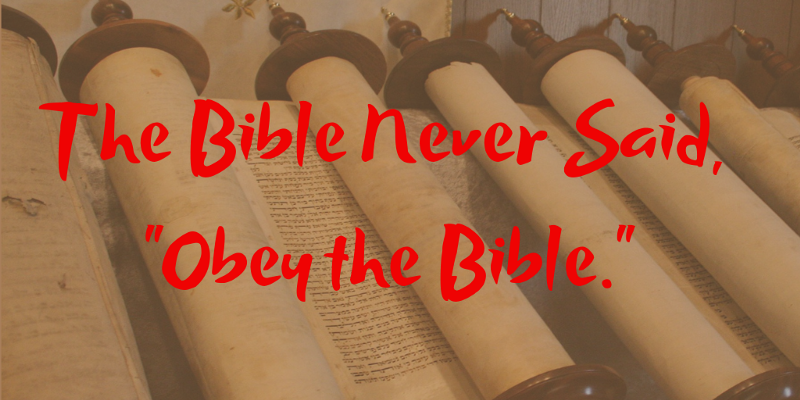Every believer in the gospel has direct guidance from God.
But even if we or an angel from heaven should preach a gospel other than the one we preached to you, let them be under God’s curse!”
Galatians 1:8
Nobody outranks the gospel.
Paul claimed no legislative authority as an apostle. Instead, he affirmed his subjection to the message he had already preached to them. He didn’t claim ongoing revelatory rights. During the two or so occasions when he preached to these people, he had given them the full revelation of God. From what he says in this verse, we can be sure that Paul never intended his letters to become addenda to the gospel.
Yes, Paul in other places1 spoke of his authority as an apostle, but that seems to have been executive authority – that is, power to protect and enforce the gospel. As an example of Paul’s apostolic authority in action, consider this instance from just before he reached the Galatian region:
They traveled through the whole island until they came to Paphos. There they met a Jewish sorcerer and false prophet named Bar-Jesus, who was an attendant of the proconsul, Sergius Paulus. The proconsul, an intelligent man, sent for Barnabas and Saul because he wanted to hear the word of God. But Elymas the sorcerer (for that is what his name means) opposed them and tried to turn the proconsul from the faith. Then Saul, who was also called Paul, filled with the Holy Spirit, looked straight at Elymas and said, “You are a child of the devil and an enemy of everything that is right! You are full of all kinds of deceit and trickery. Will you never stop perverting the right ways of the Lord? Now the hand of the Lord is against you. You are going to be blind for a time, not even able to see the light of the sun.”
Immediately mist and darkness came over him, and he groped about, seeking someone to lead him by the hand. When the proconsul saw what had happened, he believed, for he was amazed at the teaching about the Lord.
Acts 13:6-12
Paul’s words to Bar-Jesus weren’t part of “the teaching about the Lord.” Rather, they defended and confirmed the teaching. Most Christians read these verses with no inclination to strike skeptics blind. Since they are set in a narrative, we naturally understand Paul’s words to be situational. For some reason, we struggle to do the same with what he wrote to the churches. I suspect it’s because we really want a list of rules.
In making himself accountable to the gospel he’d already preached, Paul forever distinguished the gospel from any of his New Testament instructions. Christian dogma begins and ends with the gospel. Every other teaching or instruction in the New Testament ought to be evaluated pragmatically.
Let’s take Paul’s teaching on the role of women in the church as an example:
Women should remain silent in the churches. They are not allowed to speak, but must be in submission, as the law says. If they want to inquire about something, they should ask their own husbands at home…
1 Cor. 14:33-35a NIV
If we take these words as law akin to Old Testament Levitical instructions, then any time any woman speaks in any Christian assembly for any reason, she has committed a violation against God. That being the case, then she should be taken out of the assembly and stoned to death. Any men in the assembly who refuse to carry out this command would themselves be held accountable before God.
Someone might respond that we’re under a new dispensation of grace whereby this affront to God’s holiness can be overlooked.
Hardly!
Anyone who rejected the law of Moses died without mercy on the testimony of two or three witnesses. How much more severely do you think someone deserves to be punished who has trampled the Son of God underfoot, who has treated as an unholy thing the blood of the covenant that sanctified them, and who has insulted the Spirit of grace?
Hebrews 10:28-29
According to the author of the letter to the Hebrews, Christ’s death on our behalf has intensified the implications of defiance. If 1 Cor. 14:34-35 was written to reveal God’s command to the churches for all time, then we may not countenance the least infraction. Yet, wouldn’t the addition of this instruction as a rider on the gospel come under the indictment of Galatians 1:8? We can’t say that as an apostle Paul had authority to legislate where others didn’t since he called down the same curse on himself.
If 1 Corinthians 14:34-35 was written to support the gospel, it is subject to performance review. According to the immediate context, Paul wrote these instructions to promote order in the assembly and to keep the gospel from falling into public disgrace.2 As we consider the effect of this passage on the tranquility of the church and the credibility of the gospel in our day, can we say that it’s fulfilling its intended purpose?
On the other hand, what does the gospel teach about the role of women in the church? Let’s take a few gospel elements and see if we can come to a conclusion:
- Christ came into the world through a woman of faith.
- He died for all people regardless of social status, race or gender.
- He has instituted a new covenant that makes renewal through the Holy Spirit and not circumcision the hallmark of God’s people.
- That same Holy Spirit gifts people at his discretion to carry on the work of the kingdom until Christ returns.
No doubt we could come up with other pertinent bullets, but these seem to sufficiently align to point in a doctrinal direction don’t they?
Which seems the more faithful interpretation of Paul: To turn his instructions into a new written code to be mindlessly followed regardless of their implications for the gospel? Or to reject some of his instructions to more accurately express the gospel as it changes the cultural landscape?
Did I just say, “reject some of his (Paul’s) instructions”?
Yep.
I know that prospect might sound alarming to some, but remember, Paul was going around telling everyone that the message he preached had replaced the Old Testament Scriptures as the authoritative standard. The unease which arises over trading prescribed commands for a simple story has a name – “doubt.”
God can be trusted to guide his people directly through the gospel as interpreted by the Holy Spirit. Really, this is the only way to preserve authentic Christianity. If the church had agreed with Paul that the gospel alone holds the final authority, we would have been spared the rise of Islam, the Great Schism, the Crusades, the Inquisition, the Reformation, denominationalism, Mormonism, and Evangelicalism.3 In light of 2000 years of history, can we really argue the effectiveness of ecclesiastical hierarchy or biblical scholarship? Every grievous deviation I’ve mentioned was predicated either on trust in human authority, the desire for an inspired code book, or both.
You heard me.
As we have already said, so now I say again: If anybody is preaching to you a gospel other than what you accepted, let them be under God’s curse!
Galatians 1:9
This verse seems almost to repeat the preceding one, but with one crucial difference. In verse 8 he’d spoken of the gospel he’d preached. Here he speaks of the gospel they’d received. Miraculously, they were the same.
Communication is hard. We encode ideas into words which we send to someone else who we hope will be able to decode the words to reconstruct something similar to the ideas we encoded. Even if the ideas get accurately conveyed, they warp somewhat through the receiver’s perception.
This near repetition between vs. 8 and 9 seems to suggest that Paul recognized the difference between a message preached and one received. In the case of the gospel, though, he treated them both as equally inviolable. This presumes that they had accurately understood Paul’s saving message.
Paul’s curse on any apostles or angels who might proclaim another message closed the door on future revelation. Since the gospel Paul preached was the final revelation, any claims to new inspired truth could be dismissed out of hand. Before the popes, Mohammad, Joseph Smith, or L. Ron Hubbard were even born, Paul had equipped the church to reject them. As we will see, the gospel precludes supposed mediators because it has done away with the mediatorial office.
Not only had God done away with the need for divine messengers, he’s demoted religious teachers. Paul’s curse on anybody who is preaching what they hadn’t received, precludes the need for a clergy class. The gospel is a long-hidden mystery now revealed.6 It’s a story that a small child can retell. Each person can receive the gospel at their first hearing and have direct access to divine guidance from the point of belief.
The gospel which Paul preached removed the need for all human mediation between God and people until Christ returns.
God is fully capable of defending his kingdom.
It’s clear from his tone that Paul passionately opposed the activity of the Judaizers in Galatia. Why didn’t he call on the church leadership to silence them? Instead, he proclaimed a curse on such people.
The kingdom itself doesn’t need defending even if false teaching or persecution wreak havoc on the church. Those who know the gospel must handle it correctly, defending it against those who would tamper with it. However, the outcome of our efforts does not depend ultimately on us.
In calling down God’s curse, Paul affirmed God’s role and right to defend his own kingdom. The apostle to the Gentiles didn’t hurl an empty, “damn them” at the Judaizers. He called on God to superintend the glorious gospel. This literal anathema corresponds to the more specific curse which Paul cast on Bar-Jesus in the passage above. Paul demonstrated his apostolic authority through the application of divine power.7
When the church forgets that God defends his own kingdom, it resorts to worldly power structures to do the job. The history of Christendom is sullied by accounts of abuses of power by “Christian” leaders. Even in the absence of crusades, inquisitions, and scandals, church as usual often scars the souls of its members through political maneuvering and systemic manipulation.
From our vantage point, we might think that Paul had no institutional power because it wasn’t available to him. In fact, he did have institutional power. He just had to give it up to become a follower of Christ.
Footnotes:
- 2 Cor. 10:8; 13:10; 1 Thess. 2:6
- For God is not a God of disorder but of peace—as in all the congregations of the Lord’s people. Women should remain silent in the churches. They are not allowed to speak, but must be in submission, as the law says. If they want to inquire about something, they should ask their own husbands at home; for it is disgraceful for a woman to speak in the church. (1 Cor. 14:33-35 NIV)
- Every one of these movements and events have been predicated on either church authority, the assumption that God must reveal his will through a written text, or a combination of the two.
- Acts 11 and 15
- 1 Cor. 5
- Colossians 1:27
- Paul threatened the Corinthians with God’s disciplinary power in 1 Cor. 4:18-21.




